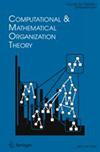Best Friends Forever: Relationship Schemas, Organizational Forms, and Institutional Change
IF 1.5
4区 管理学
Q3 COMPUTER SCIENCE, INTERDISCIPLINARY APPLICATIONS
Computational and Mathematical Organization Theory
Pub Date : 2022-01-01
DOI:10.1177/26317877211072550
引用次数: 1
Abstract
Scholars have drawn on cultural concepts to demonstrate the capacity of organizational actors to transform existing institutional scripts and invent new ones. When it comes to accounting for the limits on such change, however, scholars have tended to fall back on structural dynamics. I argue that paying attention to the symbolic analogies and oppositions in terms of which institutional schemas have meaning can shed light on the role of cultural constraints alongside creativity in institutional change. In this article, I investigate schemas of personal relationships. By transposing the obligations and expectations of a familiar relationship from one kind of interaction to another—by treating employees like members of a sports team or a research collaborative, for example—organizational actors can bring about new habits of interaction and create new organizational forms. But people’s emotional investment in the integrity of a relationship script may make them unwilling to modify the script when it proves impractical. Shared relationship schemas are thus a source of creativity and constraint. I show that understanding this dialectic accounts for several puzzling features of the diffusion of participatory democratic organizational forms among progressive movements in the late 1960s: notably, that even in the absence of a legitimated model of participatory democracy, activists adopted a similar form of organization, and that, for all their creativity, activists were unable to modify that form to cope with the inequalities it produced.永远的好朋友:关系图式、组织形式和制度变革
学者们利用文化概念来展示组织行动者改造现有制度剧本并创造新剧本的能力。然而,在解释这种变化的局限性时,学者们倾向于依靠结构动力学。我认为,关注制度图式具有意义的象征性类比和对立,可以揭示文化约束和创造力在制度变革中的作用。在本文中,我将研究个人关系的图式。通过将一种熟悉关系的义务和期望从一种互动转换为另一种互动,例如,通过将员工视为运动队或研究合作的成员,组织参与者可以带来新的互动习惯并创造新的组织形式。但是,人们在感情脚本完整性上的情感投入可能会使他们在脚本被证明不切实际时不愿意修改。因此,共享的关系模式是创造力和约束的源泉。我表明,理解这种辩证法可以解释参与式民主组织形式在20世纪60年代末进步运动中传播的几个令人困惑的特征:值得注意的是,即使在参与式民主的合法模式缺失的情况下,活动家们也采用了类似的组织形式,而且,尽管他们有创造力,活动家们无法修改这种形式来应对它所产生的不平等。
本文章由计算机程序翻译,如有差异,请以英文原文为准。
求助全文
约1分钟内获得全文
求助全文
来源期刊

Computational and Mathematical Organization Theory
COMPUTER SCIENCE, INTERDISCIPLINARY APPLICATIONS-MATHEMATICS, INTERDISCIPLINARY APPLICATIONS
CiteScore
3.80
自引率
16.70%
发文量
14
审稿时长
>12 weeks
期刊介绍:
Computational and Mathematical Organization Theory provides an international forum for interdisciplinary research that combines computation, organizations and society. The goal is to advance the state of science in formal reasoning, analysis, and system building drawing on and encouraging advances in areas at the confluence of social networks, artificial intelligence, complexity, machine learning, sociology, business, political science, economics, and operations research. The papers in this journal will lead to the development of newtheories that explain and predict the behaviour of complex adaptive systems, new computational models and technologies that are responsible to society, business, policy, and law, new methods for integrating data, computational models, analysis and visualization techniques.
Various types of papers and underlying research are welcome. Papers presenting, validating, or applying models and/or computational techniques, new algorithms, dynamic metrics for networks and complex systems and papers comparing, contrasting and docking computational models are strongly encouraged. Both applied and theoretical work is strongly encouraged. The editors encourage theoretical research on fundamental principles of social behaviour such as coordination, cooperation, evolution, and destabilization. The editors encourage applied research representing actual organizational or policy problems that can be addressed using computational tools. Work related to fundamental concepts, corporate, military or intelligence issues are welcome.
 求助内容:
求助内容: 应助结果提醒方式:
应助结果提醒方式:


